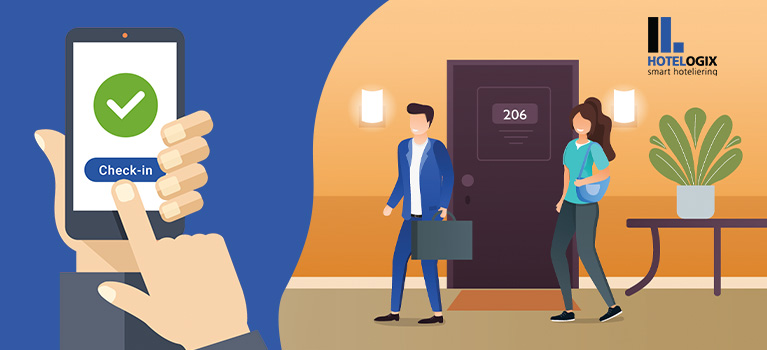To say that 2020 was a rough year for hospitality businesses is a massive understatement. It was a time of incredible upheaval, and it didn’t end when 2021 was ushered in. The lingering effects of the pandemic will likely be felt for years to come. However, while COVID-19 did the world no favors, not all the changes that came about because of the pandemic were bad. In fact, the hotel industry stands to benefit from the technology put in place to help combat the spread of the virus, as well as innovations in hotel tech that allow small hotel businesses to operate more efficiently and cost-effectively.
How are hotels using technology today? How can current hospitality tech benefit small hotels? Those are just two of the topics covered below.
Contactless Technology Boosts Traveler Confidence
One of the overriding directives to safeguard human life during the pandemic was to spend less time face-to-face with others. The virus spreads from person to person, so any in-person interaction could be dangerous. The effect this had on travelers was like a bucket of cold water – it tempered any desire to get out and see the world.
The good news is that hotel tech is now advanced enough to offer contactless check-in and check-out. There are many benefits to be found here, as well. Contactless technology can:
- Reduce lines at the front desk, reducing the risk to your guests
- Allow guests to skip the check-in and check-out lines completely and go straight to their room and then straight to their vehicle when leaving
- Boosts traveler confidence in your property and your health and hygiene procedures
- Increases the chance that guests will choose to stay at your property
What benefits does this offer to a small hotel business? There are a couple of important points here. First, the reduced load on the front desk staff is a good thing, as it ensures that they are not overwhelmed with guests. It also decreases the time it takes your staff to respond to calls and emails, further boosting guest confidence and satisfaction. Finally, there’s the element of cost control. If your front desk isn’t crowded, you can scale back on staffing.
A Scalable CRM
CRMs (customer relationships management platforms) are used throughout most industries today. They connect other parts of your hotel technology stack and bridge the gap with automation that takes the load off your staff members. The right CRM should be scalable so that it will always meet your needs no matter how small or large the hotel grows.
Automation is just one benefit of a good CRM, though. It can also be used to run marketing campaigns that drive direct bookings right to your website. Why do direct bookings matter in a day when most hotels depend on OTAs and other online travel platforms?
Simply put, you’re paying an awful lot in commission to those platforms. Every single booking that comes from an OTA incurs a commission. Direct bookings do not. So, a CRM can help you drive more bookings while also saving money at the same time. It’s a win-win.
High-Speed Wireless Internet
For many years, high-speed wireless Internet was really the purview of larger hotels and chains with deep pockets. The cost of providing high-speed Internet across an entire facility was often too much for small hotel businesses, particularly for non-traditional facilities. Today, that’s not the case.
New technology has made high-speed connectivity much more affordable. This offers benefits to the small hotel business. By offering access to high-speed Wi-Fi to your guests, you can appeal to several different segments of travelers.
- Workations – The “workation” is a thing, and it’s growing more popular by the day. In this scenario, travelers will come to your hotel for a mixture of business and leisure needs, and they’ll require high-speed Internet access for work needs.
- Digital Nomads – Remote work is now the norm, and more people than ever before are traveling while working. High-speed Internet access is vital for digital nomads.
- Everyday Consumers – The days when consumers were willing to settle for no or limited Internet access are long gone.
App Control
Another interesting advent in hotel tech is the rise of apps capable of controlling your hotel. With a cloud-based property management system, you can handle virtually any task from your smartphone, including scheduling housekeeping, handling reservations, and so much more. This offers quite a few benefits for the small hotel business.
First, it ensures that you’re able to minimize traffic and personnel on property. With fewer people, there is less risk of virus transmission and your guests will feel more confident and comfortable. Second, with fewer people needed, you’re better able to control payroll-related costs, which translates to better profitability.
App control also means more flexibility in terms of where and how administrators and managers can work. For instance, it’s no longer necessary for the manager to be in the back office to make next week’s schedule. That can open a great deal of flexibility for managers, decision-makers, and other employees in terms of when, where, and even how they work.
Online Training
Even a small hotel business must ensure that staff members are fully trained. This is critical to ensuring good guest service. However, in-person training can be problematic in a couple of ways.
In the age of COVID-19, in-person training is a no-go simply due to the risk of having too many people in the same space together. However, even before the pandemic, in-person training was problematic for a couple of reasons. For a staff member to complete training, they had to either take the time out of their shift or work extra. This created additional payroll headaches while also making it hard to schedule staffing.
With online training, none of those is a problem. Your employees can complete training as needed and whenever and wherever they want, right through a smartphone, tablet, laptop, or PC. They don’t even have to be on hotel property, which means that they can train during their downtime, which saves you the scheduling hassle.
Technology to the Rescue
As you can see, hotel technology has evolved a lot in a short amount of time. It’s also more than capable of helping your small hotel business compete against much larger chains and succeed. Whether you’re trying to build confidence in your guests, train your staff to deliver the best possible experience, or market your property to those on workcations and to digital nomads, hotel technology is the key.
This article was originally published on partner sites.



